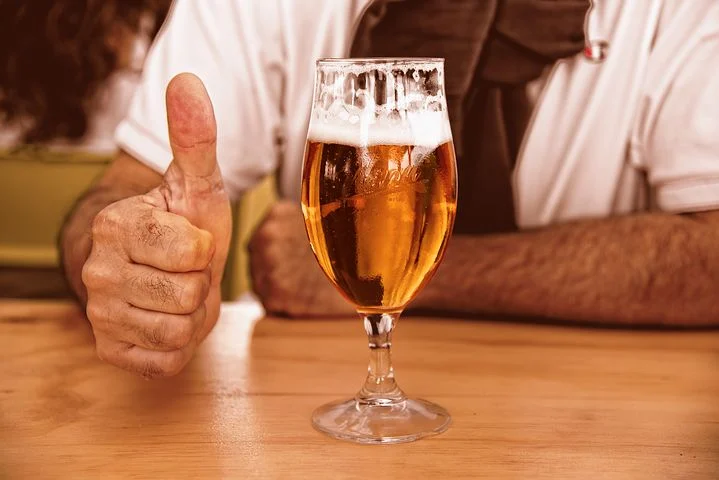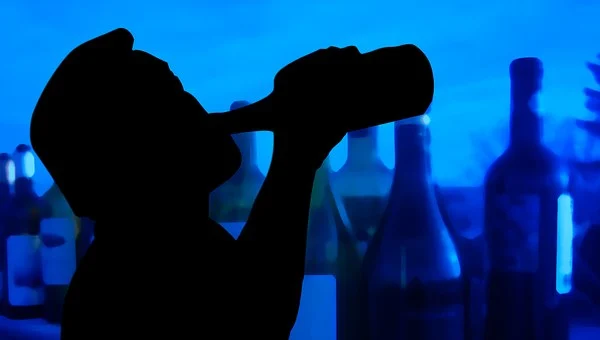Alcohol Addiction: The Early Stage

On one occasion, Welsh poet Dylan Thomas (who died of alcoholism at thirty-nine) was drinking and talking a blue streak. He suddenly stopped in mid-sentence. “Somebody’s boring me,” he said. “I think it’s me.” This darkly humorous moment is often cited as one of the early signs of alcohol addiction—when drinking begins to dominate conversations, moods, and even self-awareness.
Once you understand the basic neurological mechanisms that underlie alcoholism, the symptoms associated with the disease begin to make sense. Why are alcoholics often irritable and oversensitive? Because their brain chemistry is disordered by alcohol. Why are alcoholics depressed and sad? Because their brain cells are malfunctioning. Why do they behave in self-destructive ways? It’s all in the brain.
All diseases are identified by a cluster of symptoms (what the patient subjectively reports) and signs (what the observer can see or measure). The characteristic signs and symptoms of alcoholism are directly linked to alcohol’s effects on the central nervous system. As time goes by and the disease progresses, the symptoms and signs increase in number and severity as virtually every organ system in the body is progressively damaged.
In alcoholism, as in other chronic, progressive diseases such as cancer, diabetes, and heart disease, the symptoms are initially mild, with little indication of serious trouble. Over months or years, however, the early- and middle-stage symptoms intensify, and apparent signs of disease begin to appear in a more or less predictable course.
The Early Stage
Alcoholism differs from virtually every other disease process in that it begins with symptoms indicating an improvement in functioning. These early-stage symptoms make sense only when you understand that the disease is characterised by neurological adaptations, which enhance the pleasurable sensations of drinking while diminishing the unpleasant effects. Only later do these adaptations lead to physical and mental deterioration.
Early-stage symptoms
- The intense pleasure associated with drinking
- Lower-intensity reaction (metabolic tolerance)
- Acquired (central nervous system) tolerance
- Preoccupation with alcohol
Intense pleasure
Most people who drink alcohol feel good after the first glass of beer, wine or hard liquor. Alcohol creates a warm glow, a melting, freeing sensation captured in the rapturous phrase often muttered after a few drinks, ‘’Ah, isn’t life good?’’

The intensity of this alcohol-induced rapture cannot be objectively measured, but is familiar enough. In his memoir A Monk Swimming, Malachy McCourt remembers his first serious drinking episode. When he was an eleven-year-old boy guzzling beer in a pub: “A great feeling of peace and contentment floated out of the heavens and wrapped itself around my being, softly and lovingly clothing me in spiritual finery and the understanding that I was the best boy in the whole wide world and there wasn’t anything I couldn’t be or do in this life.”
In another testimonial to alcohol-induced bliss, Jean Kirkpatrick, founder of Women for Sobriety, describes her early experiences with the drug during her teenage years:
Before drinking, I felt unloved, unpopular, undesirable and other un’s that one can think of. I wanted to be popular. I wanted to be the “life of the party.” And when I first had a few drinks, it seemed as if I had found the nectar of the gods. Just a few drinks, and I began to believe I was all those things I wanted to be. I felt as if I were oozing charisma. My personality changed, and I had the dynamic feeling I had longed for. And all this happened with so little effort. Just a few drinks!
Lower-intensity reaction
Early-stage alcoholics typically experience a lower-intensity reaction to alcohol’s effects. A ten-year study by the University of California evaluated the impact of five drinks (the amount depended on the subject’s weight) on the behavioural and perceptual reactions of 453 college-age men. Half of the men had severely impaired alcoholic fathers, while the other half had no known alcoholic biological relatives.
Subjective feelings of intoxication measured reactions, measures of brain activity, hormone levels, and standing steadiness tests that calculated body sway when under the influence. Compared to 10 per cent of the control group, 40 per cent of the men with a positive family history of alcoholism demonstrated “remarkably” low levels of reaction to alcohol. From the research, it was concluded that “reduced sensitivity to lower doses of alcohol makes it more likely that excessive alcohol consumption and subsequent alcohol-related difficulties will occur in about half of the children of alcoholics.”
Acquired (central nervous system) tolerance
Acquired tolerance is a symptom of central nervous system adaptation to alcohol. It represents actual physical alterations in the nervous system, leading to improved functioning when under the influence of alcohol.
Acquired tolerance for drinking a lot of alcohol without feeling or showing the effects is a common symptom of early- and early-middle-stage alcoholism. “I could drink everybody under the table. I took everyone home,” recalled Marty Mann, the first woman to remain sober in Alcoholics Anonymous.
Not all alcoholics share the same early experiences with alcohol. Still, many report a remarkably high tolerance for alcohol and a marked absence of aftereffects following a night of heavy drinking. It is perhaps ironic that many alcoholics report fewer adverse side effects to alcohol in their early drinking careers than do normal drinkers. High tolerance for alcohol is a clear sign of the brain’s early, adaptive responses to alcohol.
Preoccupation with alcohol
As the months and years go by, the early-stage alcoholic begins to experience a preoccupation with alcohol (or drugs, as the case may be). Everything feels so good, so right when you’re drinking that the desire to repeat the experience seems perfectly sensible. Since drinking is so much fun and makes you feel on top of the world, how can it possibly be bad for you?
In Drinking: A Love Story, Caroline Knapp describes the way alcohol made her feel when she used to drink with a friend at the Ritz Hotel bar in Boston:
I loved those moments, that sense that the world had boiled down to such simple elements: me and Sam and the two glasses on the table; everything else – the clink of waiters clearing tables, the low buzz of talk from others around us – just background music. Drinking was the best way I knew, the fastest and simplest, to let my feelings out and just connect with another human being. The comfort was enormous: I was an easier, stronger version of myself, as though I’d been coated from the inside out with a warm liquid armour…
The amazing thing was how effective the drink was, how easily you could uncork a sense of well-being, how magical it was – magical!
This is the beginning of alcohol addiction. It progresses on to the middle stage and the late stage. It is easier and less harmful to intervene at an early stage for addiction treatment.
If you or a loved one is struggling with addiction, call +91 90008 50001